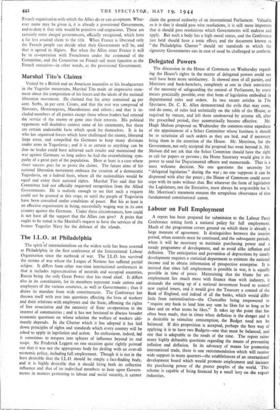Labour on Full Employment
A report has been prepared for submission to the Labour Party Conference setting forth a national policy for full employment. Much of the programme covers ground on which there is already a large measure of agreement. It distinguishes between the interim period, when controls must be continued, and the subsequent periods, when it will be necessary to maintain purchasing power and a steady programme of development, and to avoid alike inflation and deflation. The anticipation and prevention of depressions by timely development requires a statistical department to estimate the national income and to obtain information of prospective enterprise. It is insisted that since full employment is possible in war, it is equally possible in time of peace. Maintaining that the blame for un- employment lies much more with finance than with industry, it demands the setting up of a national investment board to control new capital issues, and it would give the Treasury a control of the Bank of England, and indeed of all the banks, which would differ little from nationalisation—the Chancellor being empowered to " require any bank to lend him any sum he likes for as long as he likes and on what terms he likes." It takes up the point that has often been made, that in times when deflation is the danger and it is desirable to stimulate consumption, the Budget need not be balanced. If this proposition is accepted, perhaps the best way of applying it is to have two Budgets—one that must be balanced, and one that is adaptable to the needs of the time. The report raises many highly debatable questions regarding the means of preventing inflation and deflation. In its advocacy of means for promoting international trade, there is one recommendation which will receive wide support in many quarters—the establishment of an international development board which would promote employment and increase the purchasing power of the poorer peoples of the world. This scheme is capable of being financed by a small levy on the export industries.


























 Previous page
Previous page